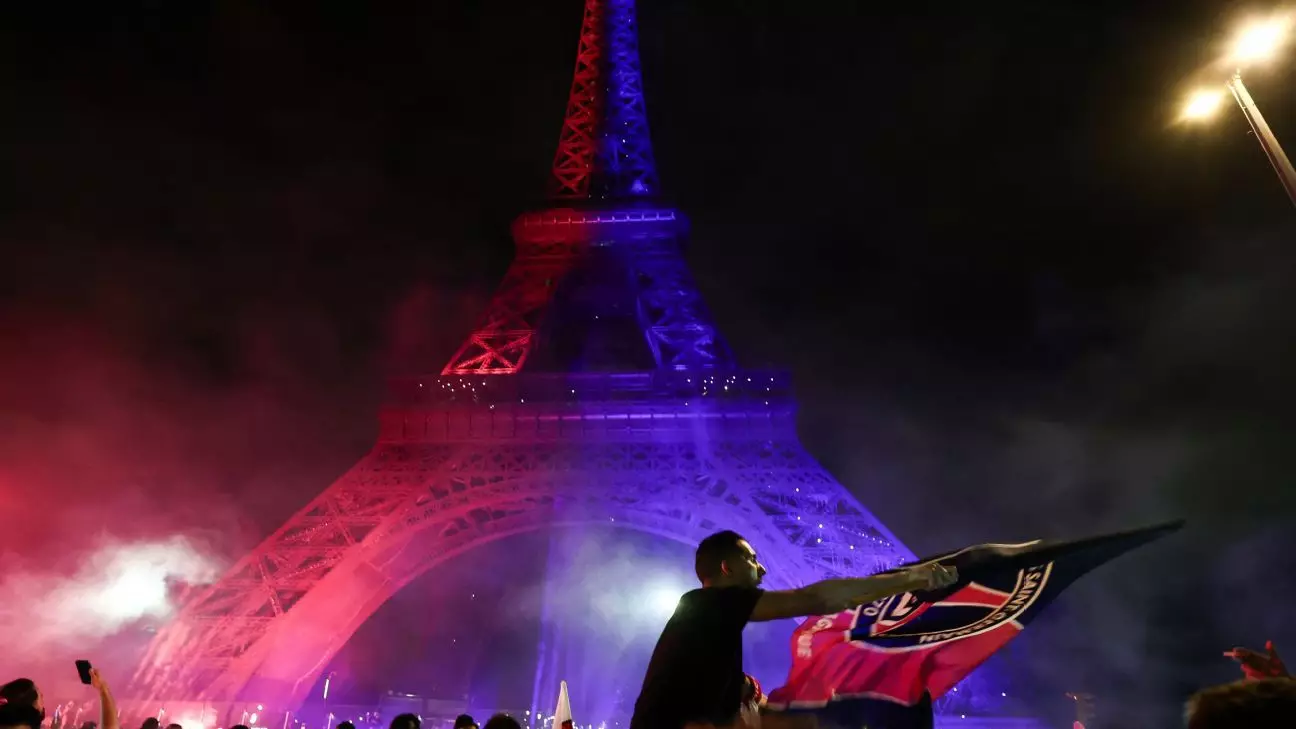Recent events in France have unwrapped a chilling paradox, where jubilation is tainted by tragedy. Following Paris Saint-Germain’s monumental victory in the Champions League—a long-awaited dream realized amid a 5-0 thrashing of Inter Milan—the nation found itself divided between celebration and despair. The Eiffel Tower presented a stunning display of team colors, drawing thousands to revel in the historic moment. Yet, just beneath the surface of this collective joy lay a disturbing reality that should provoke intense scrutiny of our culture surrounding sports celebrations.
What commenced as a night of exhilaration morphed into chaos, leading to the deaths of two fans and serious injury to a police officer, who rests in a coma. The 17-year-old boy in Dax who was fatally stabbed, and the man in Paris killed in a tragic car accident, serve as alarming reminders of how quickly euphoria can devolve into violence. Such events raise crucial questions about societal responsibility during massive public gatherings. Are we as a society lulled into complacency by the thrill of victory, neglecting the consequences of our actions?
The Inevitable Descent into Disorder
In analyzing the aftermath of this chaotic night, it’s evident that a troubling trend exists in our sporting culture. While the Department of Interior in France has established expectations of safety and order, incidents such as these illustrate a glaring disconnect. What was touted as a festive celebration was marked by incidents of violence, looting, and the aggressive use of police tactics such as tear gas and water cannons. This duality—a heartwarming celebration for some, a brutal reality for others—is a reflection of a deeper societal malaise that must be confronted.
Police Chief Laurent Nunez characterized the unrest as perpetrated by “thousands of people who came to commit acts of violence,” suggesting an underlying culture that allows for such behavior to fester. This scapegoating of the few hides a critical truth: the collective fanaticism and unchecked enthusiasm of large crowds often walk a fine line. The excitement unleashed by a unifying success can quickly spiral out of control, challenging the very fabric of community spirit that sports are intended to embody.
Bridging the Gap Between Celebration and Safety
As we reflect on the events surrounding PSG’s victory, one must consider how we can bridge the gap between passionate fandom and public safety. The irony of sporting events being both a source of unity and a breeding ground for conflict cannot be ignored. If we desire a future where our celebrations uplift rather than destroy, responsible dialogue must begin immediately. Fostering a culture that prioritizes safety, owning the hype responsibly, and demanding accountability from individuals and groups is essential.
The use of excessive force by law enforcement raises another critical point about the methods employed to control these celebrations. The deployment of tear gas and water cannons exemplifies a reactionary approach that can escalate tensions rather than quell them. Could we rethink the paradigms of crowd control and community interaction at such events? Engagement strategies that emphasize communication and community support may ultimately prove more effective in diffusing situations that threaten to turn violent.
The Need for Reflection and Responsibility
Ultimately, the tragedy surrounding what should have been an uplifting night should serve as a call to action. As fans, organizers, and community leaders, we must reflect upon our responsibilities when engaging with sports culture. The outsized enthusiasm that drives fans to celebrate their teams must be tempered with awareness of potential consequences. We must remember that our actions, whether celebratory or reckless, have lasting impacts on our communities.
As we look to the future of sports celebrations in France and beyond, we ought to encourage a culture of support and mindfulness. While we cheer our teams with fervor, let us not forget the importance of safeguarding each other during these moments of shared joy. After all, the spirit of sport should unite us, not divide us into victims and perpetrators.


Leave a Reply